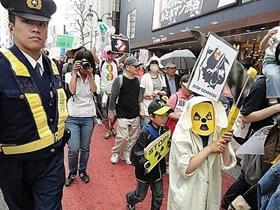
Japanese fruit exports are struggling through one of their toughest-ever years. The unresolved nuclear crisis at Fukushima Daiichi nuclear power plant continues to raise fears over radioactive contamination of food domestically and in many of Japan’s key export markets.
Earlier this week, high levels of radiation were found in rice production in Nihonmatsu, Fukushima Prefecture, only 35 miles west of the stricken power plant, according to media reports.
The unharvested rice contained 500 becquerels of cesium per kg, and while this is the maximum permissible level and considered safe for consumption, prefectural officials were mulling a ban if further tests showed similar results.
Japan’s unresolved radiation issue together with the country’s sky-high currency are taking their toll on the nation’s food exports.
“Our overall export demand is down 75-80 per cent compared to this time last year,” reveals Don Okazoe, managing director of IPM Nishimoto, a relative newcomer into the export side of the trade but an established importer of fresh produce. Although the company only began exporting peaches last year in small volumes, Mr Okazoe reports “a 100 per cent drop out rate for peach exports versus June and July last year.”
This drop in Japanese summerfruit demand is evident in Taiwan, traditionally one of Japan’s biggest export markets particularly for apples. “We decided against importing any volumes of summer fruits such as peaches and grapes this year,” reveals Adeline Wen from Taiwanese importer Fullbloom.
Taiwan imports a significant percentage of its apples from Japan, so all eyes will be on the country over the coming season, which begins in October and runs through May. In the months following the radiation leaks there were rumours of Taiwanese retailers trying to pass Japanese apples off as Korean to sell unwanted inventory.
Early indications are that Japan’s largest export line, apples, which last year accounted for around 83 per cent of total fruit export volumes and garnered 75 per cent of export value, will be greatly affected.
Kobe Yoko, one of the country’s most established exporters, has deep concerns for this season. “Our export business is 60 per cent down from last year,” reveals sales director Masahiro Sumiya. “We are not optimistic about our exports as our situation is still very severe.”
The full version of this report will be published in the October issue of Asiafruit Magazine.



